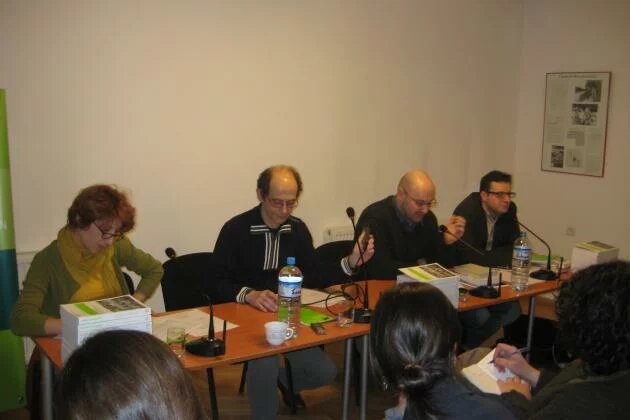
Speakers:
Zaal Andronikashvili – Research Fellow, Center of Literature and Culture, Berlin;
Eka Aghdgomelashvili – Gender Specialist/"Inclusive" Foundation
Giga Zedania – I. Chavchavadze State University
Moderation: Giorgi Gvakharia
Nino Lejava, Program Coordinator of South Caucasus Regional Office of the Heinrich Boell Foundation opened public debates and presented a new book published by the Foundation “Meddling is Desirable – Public Debates at the Heinrich Boell Foundation”. The book consists of the debates held in 2007-2008 which have been conducted in the frames of the project “Public Debates on Modernization of Georgia”.
Giga Zedania presented the history of origin of modernization as a concept, as well as offered the interpretation thereof. According to Zedania modernization can be interpreted in different aspects. It can be explained as a global process which began in the 18th century and has been speared in other countries. On the hand, the process of modernization means transferring from the traditional society into the modern one.
Analyzing the existing situation in Georgia Zedania concluded that the theory of modernization has been formed in a certain context of a concept, which is not in Georgia today, as Georgia is not a traditional country. Consequently, traditions cannot be modernized due to the lack of them; therefore, traditions are being invented in Georgia. As Zedania noted the main problem in Georgia is that two opposite processes of modernization and re-traditionalism are taking place at the same time.
According to Zaal Andronikashvili the model regarding invention of traditions from the one side, and the process of modernization on the other side is not such contradictive in reality as explained by Zedania. He thinks that it is one project, as any modern society which has been forming in the 17th18 th19th centuries created modern countries through the invention of these traditions.
Before discussing the topic of Georgian culture in the context of the modernization project, Zaal Andronikashvili noted that he meant implementation of educational philosophy in practice in the 17th18th centuries within its positive side as well as problems. He said that a national state was a political form adequately resolving problems. Other society organization forms of that period were unable to solve problems. However, as found out a national state as a form of a society organization is not able to resolve problems facing the world from the period of the second world war, especially after the destruction of the Soviet Union.
Zaal Andronikashvili stated that it is important to define the attitude of the Georgian culture and Georgians towards the time and the space. He said that from the one hand it is noticed dependence on the past which shows the completion of the history, and the future from the other hand, which is expressed in reproducing of the emptied forms. Today the future for the Georgian society is either the past increased in the side or a certain form without reflexion, the context of which is neither clear nor interesting.
At the end of debates the speaker made a conclusion that today groups of the Georgian society leave in totally different times, having no relation to each other. Correspondingly, there is no internal rule in Georgia which defines the future life. According to Andronikashvili modernization projects, as well as theoretical possibilities of development of the Georgian society will depend on a geopolitical choice of this society.
At the beginning of her speech Eka Agdgomelashvili figured out that the main problem is non-agreement and non-recognition of entire reality in members of the Georgian society. To her opinion, the process of the secondary modernization is implemented in Georgia with or without participation of the society, which means that the ideal version seems to be values of the Western European counties, and Georgia is trying to reach these values.
A country without experiencing the primary modernization is always facing a danger of occurring a conflict between the existing and new experiences and values. It is not reasonable to speak about modernization avoiding the context regarding historical, social and cultural traditions of this country. Eka Agdgomelashvili empathized the way of ordering modernization and changes. She stated that if such ordering is carried out by the society of the Western European countries it is not happening in Georgia. During the debates basic questions were related to the reasons of failure and termination of the modernization project in Georgia. Journalist Ninia Kakabadze supposed that the Georgian society has not been informed about the meaning of the modernization project. Political scientist Paata Zakareishvili explained that there was no demand for implementing the modernization project in Georgia. Poet Rati Amaglobeli said that the main problem was that the society has not acquired new values comprehensively.
Journalist Nino Danelia noted that modernization has been faced a lot of barriers from the Georgian society. She believes that the majority of the society does not wish to have a country where the Georgian traditions are interpreted differently. At the end of the debates Sergo Ratiani, I. Chavchavadze State University Professor stated that the society should analyse objective problems of the modernization project and should not blame only concrete persons (i.e. government of the “Rose Revolution”) for their incorrect activities.
Download report in Georgian pdf (21 pages, 123 KB)